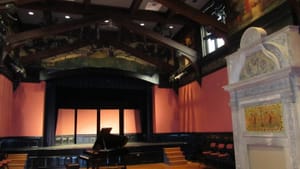Stay in the Loop
BSR publishes on a weekly schedule, with an email newsletter every Wednesday and Thursday morning. There’s no paywall, and subscribing is always free.
Art song in the age of the living room
Lyric Fest's Vienna: City of Song

Lyric Fest opened its 2014-15 season with Vienna, City of Song: Art Song in the Age of the Living Room, and the auditorium in the Academy of Vocal Arts’s gorgeous building was the perfect setting.
More a large living-room-with-stage than an auditorium, it is a bit small when used for opera, but the ideal space for such a Hauskonzert. The artists performed in front of the beautiful fireplace rather than on the stage, and the audience was fanned out close by.
Many of the greatest works of chamber music and song by German and Austrian composers of the 18th and 19th centuries were first heard in the homes of friends, often fellow musicians who, with the composers, performed the pieces in this relaxed, congenial atmosphere. With Vienna the home of Mozart, Beethoven, Schubert, Brahms, Wolf, Mahler, Strauss, and others at various times in their lives, it probably has had more such musical parties than any other city. The above song-masters were all represented, plus Joseph Marx and those emissaries of the Second Viennese School, Schoenberg, Berg, and Webern. The quintessential Lied-composer Schumann was missing because he never lived in Vienna.
At home with their range
The vocalists were mezzo Suzanne DuPlantis (one of Lyric Fest’s artistic directors and cofounders) and two relative newcomers. DuPlantis, best-known as a song recitalist, projects warmth of both voice and personality, with a true mezzo timbre and easy high and low ranges. Her voice appears eternally young while her interpretations seem to gain in subtlety and depth: Every Lied she offered, whether by Mozart, Schubert, Brahms, Mahler, or Strauss, was distinctive in sound and style. Her German is excellent, not only in the diction but also in the use of the words — not a given, even among some of her most-esteemed colleagues.
Light-lyric soprano Erica Miller (coloratura, too: her operatic debut last year was as the Queen of the Night) produced some lovely singing, especially in quieter moments and in unforced, effortless high notes, though her voice often lost focus under pressure. She was at her best, and that was outstanding, in what was theoretically the most difficult repertoire: the Lieder by Webern, Berg, and Schoenberg, including Schoenberg’s 1909 “Das Buch der hängenden Gärten,” considered the first-ever 12-tone composition.
Lyric baritone Gabriel Preisser has a pleasant voice, smooth from top to bottom, and he showed a wide range of expression, from the sly humor of Beethoven’s “Der Kuss” to Strauss’s rapid, intense “Heimliche Aufforderung” and the languid phrases and impassioned moments of Schubert’s famous “Ständchen.” However, both he and Miller need some work on their German. Interestingly, Miller’s was much better in the 20th-century songs, leading me to suspect that she learned them recently: There is a muscle-memory that keeps a singer’s pronunciation of a foreign language as he or she first learned it, even if that was at age 14.
The true star, though, was super-pianist Laura Ward, Lyric Fest's other artistic director. Her technique is exceptionally accurate and precise even at warp speed, as in two of the Strauss Lieder, but even more important is her exquisite phrasing in slower sections. She literally breathes with the singers and, at any velocity or dynamic level, while projecting the composer’s pianistic world, her playing supports and brings out both the melody and the poetry. Her commentary-with-piano on Wolf’s “Storchenbotschaft” was illuminating, entertaining, and technically amazing. Lucky singers, to work with her!
More than just music
Local composer Kile Smith, a regular BSR contributor and recently awarded the position of Lyric Fest composer in residence thanks to a grant from the Presser Foundation, was the narrator. His presentation was also relaxed; he gave astute analysis and fascinating historic detail without being either esoteric or patronizing, adding frequent touches of sharp wit and gentle humor. And he has a beautiful speaking voice (familiar to us from his stints on WRTI). The singers also had opportunities to speak briefly about their songs, both informatively and amusingly.
For instance, quoting Mozart writing to his father (“I want to write opera!”), DuPlantis suggested listening to the young composer’s “Das Veilchen” as if it were an opera, and she then gave it a slightly operatic touch, perfect for the tragic plot of the poor violet, hoping to be plucked and pressed to the bosom of a shepherdess, but dying happy as she unwittingly steps on him.
Unexpectedly, given the preponderance of Classical and Romantic works on hand, Lyric Fest’s Viennese sojourn provided the simplest and clearest definition of 12-tone music in my experience, by soprano Miller. She added a comparison to Sudoku “but with 12 numbers — and the same sense of satisfaction when you solve it.”
What, When, Where
Vienna, City of Song. Songs by Schubert, Mozart, Beethoven, Brahms, Strauss, Wolf, Mahler, and more. With Erica Miller, Gabriel Preisser, Suzanne DuPlantis, pianist Laura Ward, and Kile Smith, narrator.
Sunday, October 5, 2014 at 3pm at The Academy of Vocal Arts, 1920 Spruce Street, Philadelphia; Monday, October 6, 2014 at 7:30pm at Bryn Mawr College; Saturday, March 28, 2015 at 5pm at Woodmere Art Museum, 9201 Germantown Avenue, Philadelphia. (abbreviated performance with Erica Miller, Suzanne DuPlantis, and Randall Scarlata. Ticketed through Woodmere Art Museum).
Sign up for our newsletter
All of the week's new articles, all in one place. Sign up for the free weekly BSR newsletters, and don't miss a conversation.
